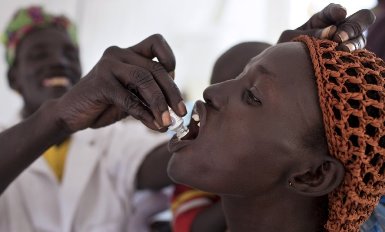IOM responds as cholera outbreak spreads in South Sudan
May 10, 2017 (WAU) – The International Organization for Immigration (IOM) said its team had been deployed to Jonglei, South Sudan, late last month (25 April) in response to a cholera outbreak which affected over 230 people in Ayod County.

Relief agencies have responded to cholera outbreaks across the country, with nine countries currently reporting active transmission, including three in Jonglei alone. Since the cholera outbreak was declared in June 2016, over 7,200 cases have been reported, including 229 deaths according to World Health Organization (WHO) and the South Sudan Ministry of Health.
IOM’s response began after 140 suspected cases of cholera were reported in Ayod during the first weeks of April, putting the population of approximately 175,000 people at risk. Access to Ayod is difficult during the rainy season, and its proximity to the Nile River increases its vulnerability to outbreaks of water-borne diseases such as cholera.
Due to the ongoing crisis in Jonglei, health facilities in Ayod have not been functioning and face a lack of health workers and medical supplies.
IOM, working alongside the County Health Department and the Christian Mission for Development (CMD) in the town of Jiech has been facilitating surveillance, managing cases and improving community outreach efforts to stem the outbreak.
The majority of the suspected cholera cases come from communities living in cattle camps along the river. IOM has established oral rehydration points in three hotspot areas to increase access to treatment.
“Conditions are extremely difficult for families in Jiech,” explains Carol Kipsang, an IOM health officer and nurse. “We met one mother who was caring for her newborn and her sister’s child after her sister died from cholera two weeks ago in her community. The young mother walked one hour to the IOM clinic to receive treatment for the children and seek nutritional support for her malnourished daughter.”
To ensure access to supplies required for a cholera response, the WHO has provided response kits, medication and equipment for the oral rehydration points and cholera treatment units.
The IOM team has also delivered essential medications to treat other common illnesses during the mission.
To date, IOM has reported treating at least 40 people suffering from cholera symptoms and conducted nearly 2,400 health consultations. The team plans to hand over operations to CMD in the coming days but will continue providing additional supplies for the on-going response.
Through the USAID Office of U.S. Foreign Disaster Assistance Rapid Response Fund (RRF), IOM will continue to support CMD’s response in Ayod, as well as Sudan Medical Care in Duk County, Jonglei, where over 380 suspected cholera cases have been reported. The RRF continues to support health partners in Yirol East, where health agencies have been responding to a cholera outbreak since February.
Elsewhere, an IOM water, sanitation and hygiene (WASH) team has responded to suspected cases of cholera in Kopoeta, Eastern Equatoria, through hygiene promotion activities aimed at mitigating the spread of the disease. The team deployed on 4 May and immediately began recruiting hygiene promoters from the local community to ensure a quick and effective response after several suspected cases were reported in the area.
Since the cholera outbreak began in 2016, IOM has responded in remote locations and displacement sites throughout South Sudan to manage cases and mitigate the further spread of the disease. On a daily basis, teams continually conduct health and hygiene promotion activities to ensure vulnerable populations have access to basic information to keep their families healthy despite displacement and difficult living conditions.
(ST)
